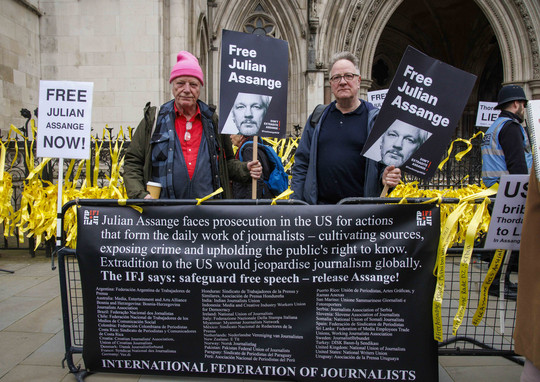The promise arises from the last occasion these distinguished jurists considered this case. In February they heard what was expected to be Assange’s final plea that his extradition to the United States be not allowed. To the surprise of many, instead of a decision, the judges sought assurances from across the Atlantic.
One question was a technicality. Was it possible that the US would execute Assange? A previous UK Home Secretary had failed to seek this clarification at an earlier stage. Washington’s answer was, wholly predictably, that the electric chair (or similar) would not be deployed in this case.
The other question was more interesting: “is [Assange] permitted to rely on the First Amendment… by reason of his nationality”?
The amendment referred to here is the First Amendment to the US Constitution, adopted into law in 1791 – two years after the constitution itself. It guarantees freedom of speech and freedom of the press.
Clarification was necessary because of a warning issued by Mike Pompeo in 2017 when he was director of the CIA. He would later serve as Trump’s Secretary of State. “Julian Assange… pretended (that) America’s First Amendment freedom shield(s) (him) from justice. (He) may have believed that, but (he’s) wrong. Assange is a narcissist who has created nothing of value.”
Pompeo’s disturbing argument rests on the the opening words of the US Constitution: “We, the people of the United States… secure the blessings of liberty to ourselves”. According to this argument the US Constitution’s protections apply only to citizens of that country – and certainly not to Australians.
This potential for unfairness clearly troubled the British judges. They wanted to know if the US Government would guarantee that, despite Assange’s nationality, he would be protected just as would be a US citizen?
The answer, when it came, was this: “Assange will have the ability to raise and seek to rely upon the rights and amendments given upon the First Amendment. A decision as to its applicability will be entirely in the purview of the US courts”.
It is hard not to join Assange’s wife Stella in dismissing these as ‘weasel words’. The judges, of course, will be required to take a wholly dispassionate view.
Doing this will require them to form an opinion of whether, whatever their actual words, the US Government can be relied upon to tell the truth – and here, the evidence to consider is as plentiful as it is troubling.
During the extradition hearings we learned that operatives close to the CIA bugged the Ecuadorian embassy while Assange was resident, listening in on his meetings with lawyers and even tried to steal a baby’s nappy to undertake a DNA test.
Since then, Yahoo News reproduced the testimony of more than 30 former CIA staff who said that the Agency had devoted hours of planning to find a way to murder Assange while he was in London.
More revealingly still, during the extradition hearings we learned from the barristers acting for the US just how their paymaster exploits weasel words. The KCs argued repeatedly that the protections apparently provided in simple terms on the first page of in the US/UK Extradition Treaty, are, in fact, meaningless window dressing, presumably intended to provide false reassurance to those without expensive legal training?
All of this and more must form part of the consideration of Johnson and Sharp as they weigh both the quality of the assurance and the probity of the administration from which it has issued.
Should they find themselves unpersuaded by the US ‘assurances’, they will order a full appeal hearing. This would probably take place later this year, or in early 2025 and will require several further weeks in court.
Should the opposite view prevail, then the UK legal process will be at an end. A slight chance remains that the European Court of Human Rights might consider Assange’s appeal – his application has already been entered. The vast majority of disputes referred to the ECtHR do not receive a hearing, however, as they don’t involve contested points of law. The most likely outcome in this case is that Assange will be on a plane to Virginia within days.
Of course, there is still a chance that this whole murky episode could be resolved by a man who last practiced law in 1972 – President Joe Biden. In April a reporter asked the President what he thought of Australia’s request that Assange be returned to his home country. “We are considering it”, he replied. US diplomats have provided similar hints in the past.
Surely this would be the best solution? Whatever your opinion of Assange, he has already languished in prison for more than five years. Down this path, the US could start to rebuild its reputation as a guarantor of free speech, and the world’s journalists could return to illuminating societies’ darker corners, free from the risk of a lifetime behind bars.
Tim Dawson is the Deputy General Secretary of the International Federation of Journalists (IFJ). This article has been previously published in The Morning Star.

